The National Tutoring Programme
Help your tutoring funding reach more pupils with one to one maths tutoring that’s built for school budgets

Third Space Learning is just as effective as bringing in a one-to-one tutor but it’s so much cheaper, so you can afford to have more children doing it. Plus, the children love it and they’re so enthusiastic about it! What’s not to like? It’s cheaper, the children do just as well and they really like it!
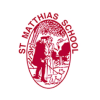
Clare Sealy, Headteacher
St. Matthias Primary School, London
What is the National Tutoring Programme?
Additional ring-fenced funding for all state-funded schools in England
A minimum of £67.50 per pupil eligible for Pupil Premium, but can be used to support any pupil
Can be used to cover up to 50% of the cost of tuition up to £18 per pupil per hour
Schools must choose tutoring providers that are quality-assured by the DfE
Why do so many schools choose Third Space Learning?
Less than half the price of the average cost of one to one tutoring
Pupils receive personalised one to one tutoring from specially trained maths tutors
Scaffolded lessons developed by former teachers to build conceptual understanding
Proven and trusted by 4,000 schools to close gaps, build confidence and boost progress
Measurable impact on progress and confidence
Close gaps
90% of pupils show a solid understanding of each concept at the end of each session.

Double progress
In an independent trial, pupils made 7 months’ progress in 14 weeks.

Boost confidence
70% of pupils who report low confidence at the start say it has improved after their sessions.

Improve exam results
100% of teachers surveyed felt the sessions helped pupils achieve higher scores in 2023.

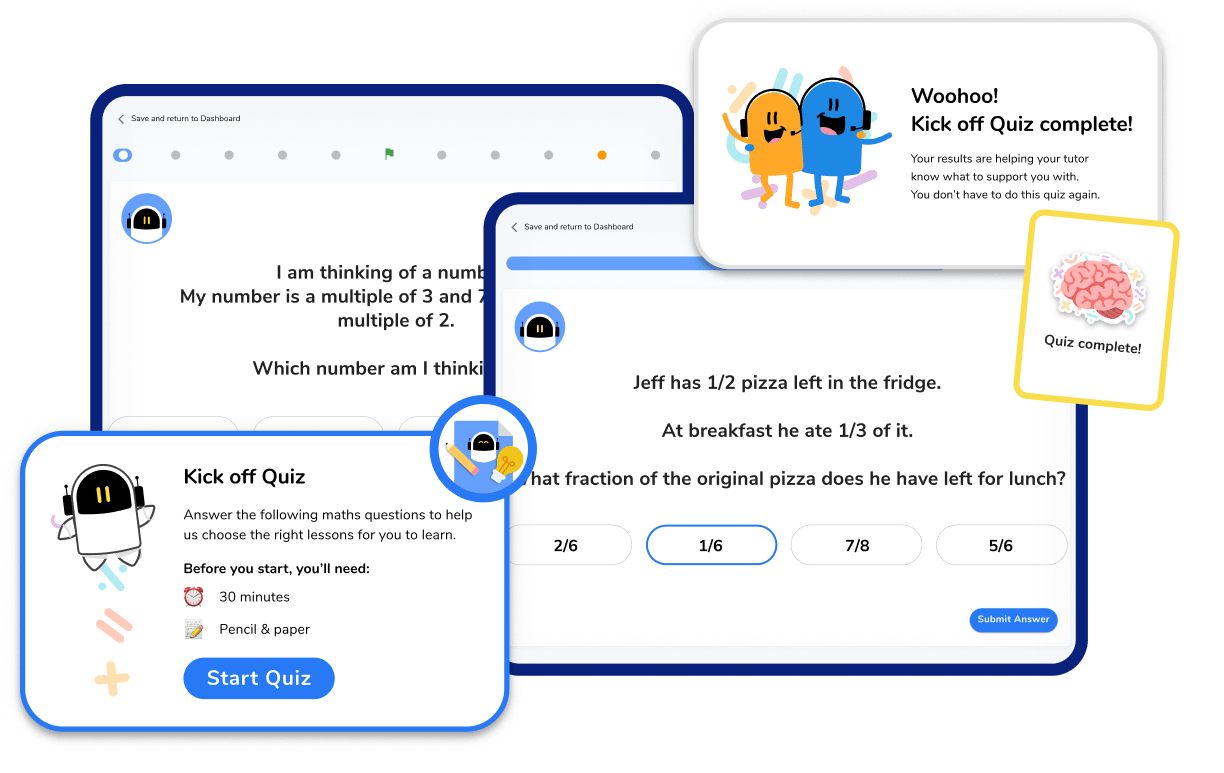
Regular assessments to personalise learning
All pupils start with an initial assessment to diagnose gaps and identify the best sequence of lessons for each pupil. Mini-assessments after each session keep this continuously updated.
An end-of-programme assessment shows exactly how pupils have progressed in the topics they’ve covered.
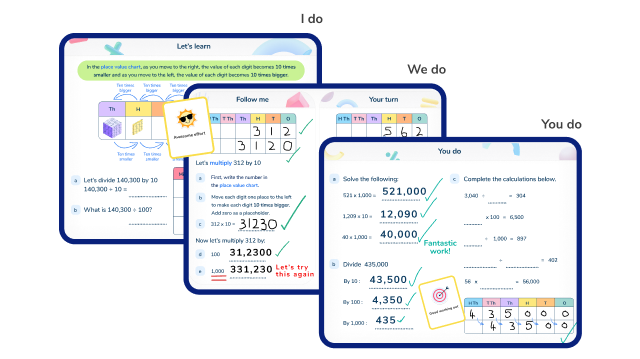
One to one teaching to suit each pupil
Tutors adapt the pitch and pace of each session to suit. Scaffolded teaching slides and an ‘I do, we do, you do’ structure enable tutors to provide the exact level of support each pupil needs.
Tutors take the time to get to know their pupils and bring lessons into the real-world by framing questions around their hobbies and interests.
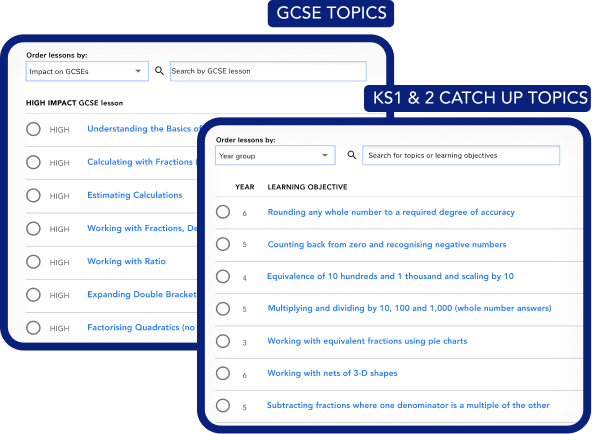
Linked to classroom teaching
Diagnostic assessments focus on priority topics as identified by each pupil’s class teacher. Each diagnosable gap is linked to an individual Learning Objective designed to plug this gap.
You choose for Learning Objectives to be automatically selected each week, or to manually select Learning Objectives from our GCSE, KS1, KS2 or SATs curriculum. You’re free to skip lessons or amend the order at any time.
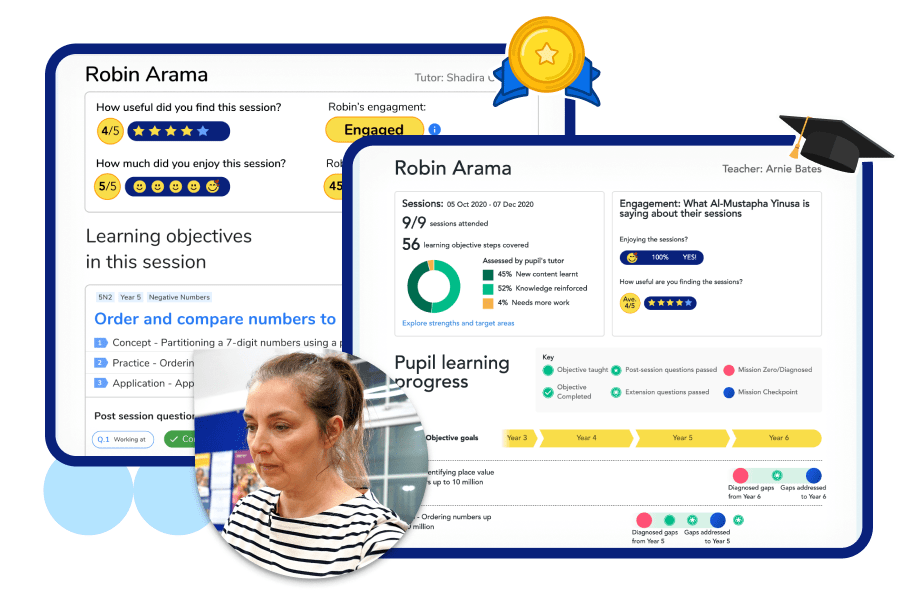
Regular reports to monitor progress
Reports are available every step of the way to ensure you’re kept up to date with how your pupils are getting on, including:
Assessment results
Topics covered in each session
Progress made over time
Pupil engagement and enjoyment
Tutor and pupil feedback
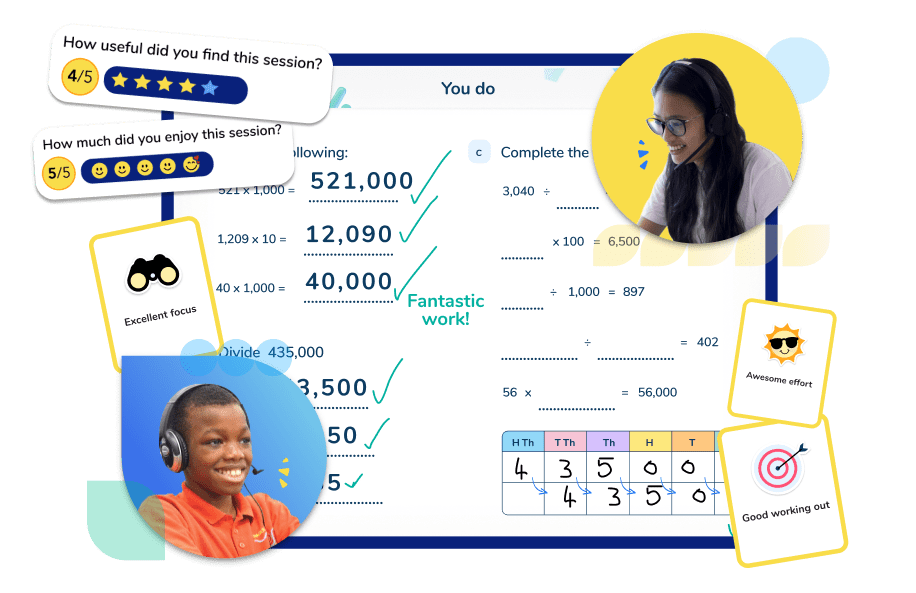
Real-time feedback for pupils and teachers
Tutors guide pupils through each question, providing feedback and academic support, asking questions and giving praise as they go. Tutors praise pupils for their effort, explanation, focus and working out, not just for finding the correct answer.
Same-day session reports show topics covered, pupil mindset and tutor feedback for each tuition session.
Request a quote
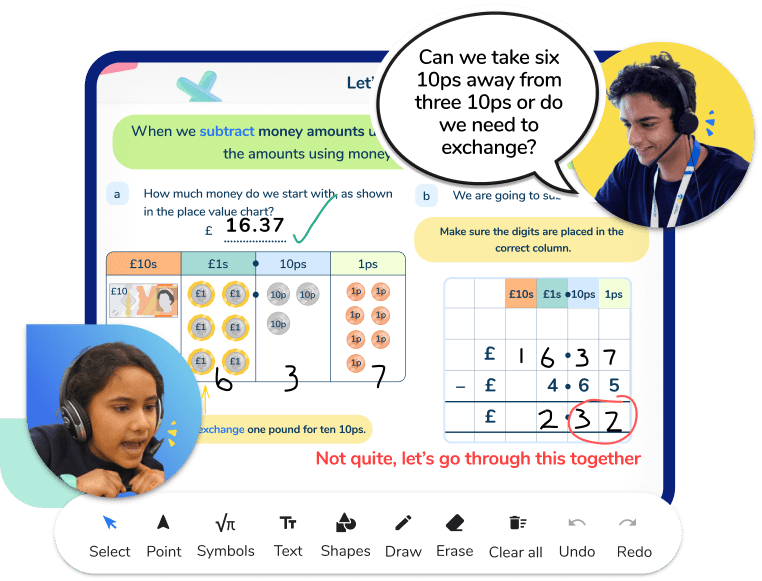
More opportunities for maths talk time
One to one tuition means your pupils engage in meaningful maths conversations with their tutor.
Tutors ask questions like ‘how did you work that out?’ and ‘how would you explain your answer?’ to ensure pupils have really got to grips with the underlying maths behind each question.
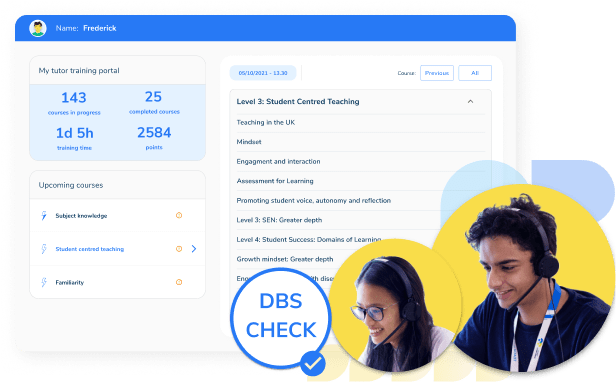
Quality assurance
All tutors are graduates and undergraduates in STEM subjects and undergo a rigorous application including safeguarding and background checks; only 2% of applicants are accepted onto the programme.
Each tutor completes our intensive three-week tutor training programme before delivering their first session and receives regular and ongoing CPD. Our curriculum, resources and training programmes are designed by qualified teachers with teaching experience at UK schools.
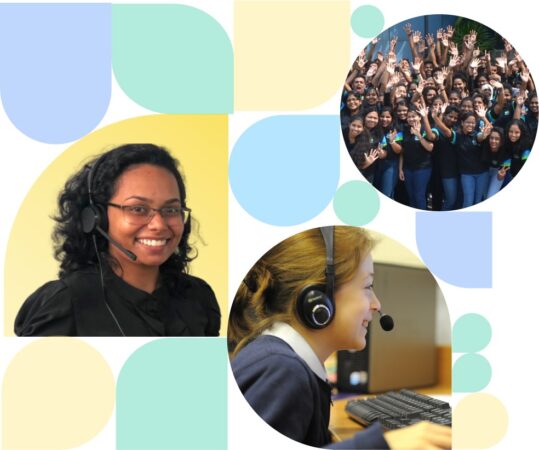
Reduced workload
With Third Space Learning, schools can enjoy the benefits of tutoring without an increase in workload. We recruit, train and retain expert staff.
Schools opting for the NTP school-led tutoring route will need to take care of this themselves, hiring and training new or existing teachers or teaching assistants. For many busy primary and secondary schools, this will be an added challenge.
Request a personalised quote for your school
Let us know how many pupils you’re looking to support and we’ll be in touch with more information about how it works, the impact you can expect to see and a personalised quote for your school.
Your school will be able to use your National Tutoring Programme funding to help cover the cost.
56% cheaper than the average cost of online one to one tutoring
The UK’s most affordable DfE-approved tutoring partner
Includes free headsets, diagnostic assessments and regular reports
Discounts available for long-term bookings and MATs
You can learn more about how we keep your data safe and secure in our privacy policy.
Frequently asked questions
Do schools need to apply for the National Tutoring Programme funding?
There is no requirement for schools to apply for this funding. The grant will be paid through ESFA as part of the DfE’s scheduled payments to schools.
When will schools receive payment?
Local authorities and academies will automatically receive their funding in three stages across the year; September, December and April.
Is this funding exclusively for pupils eligible for pupil premium?
No, although the funding has previously been calculated based on Pupil Premium eligible pupils, this is just a way of allocating funding per school. Teachers are free to use their own discretion to decide which pupils need additional tuition.
Do schools have to spend their tuition funding?
Yes, any money unspent or not spent on tutoring or on academic mentors (another route of the NTP) will be recovered at the end of the academic year.
What funding is available to cover costs not covered by this funding?
Schools can use existing school budgets such as Pupil Premium to cover the remaining costs.
Can schools use their NTP funding on tuition from Third Space Learning?
Yes! We recommend that to provide quality additional support to the greatest number of pupils you use Third Space Learning. Our online tuition enables you to make the best use of your tuition funding but of course other DfE approved Tuition Partners are also available. Talk to several and see what works best for your school environment.
Can schools use more than one provider at the same time?
Yes, pupils are able to receive tuition from more than one NTP tuition partner at a time. This is particularly useful if you would like pupils to receive support in more than one subject. Similarly, there is no limit on the number of providers that a school can work with at once.
Will all approved providers charge the same price?
No, it’s up to the tutoring provider how much they charge. The DfE has assumed an average cost of £18 per hour (blended across one-to-one and small group tuition). The average per-pupil-per-hour cost of tutoring from DfE-approved providers ranges from £51 for one to one to £12 for 1 to 6. Because Third Space Learning delivers online maths tuition via a global tutor community, we’ve been able to provide one to one tuition for the price many other providers charge for small group sessions. We’re proud to be the most affordable one to one tutoring provider, £10 cheaper per pupil per hour than the next cheapest provider.
How will Third Space Learning support data collection?
In our termly reports, you will be able to see the number of sessions that each pupil has received, as well as the topics covered. This should make it quick and easy to collect the necessary information for the mandatory data submissions and to report to school leaders.
How long has the NTP been running?
The National Tutoring Programme was a catch-up fund set up to support pupils affected by school closures during the coronavirus pandemic and lockdown in 2020. Robust research from the Education Endowment Foundation (EEF) and the Sutton Trust demonstrated that one to one and small group tutoring was the intervention to have the greatest impact on improving outcomes for young people.
How has the NTP changed over time?
In previous years, tutoring from DfE-approved Tuition Partners was subsidised directly from the DfE, with the school only invoiced for the portion not subsidised. As of the start of the 2022-23 academic year, all NTP funding goes directly to schools. Tutoring is still available from DfE accredited Tuition Partners like Third Space Learning, but schools are invoiced the standard price and able to use their NTP funding to cover up the cost, rather than receive a subsidised invoice. If schools wish to use their NTP funding on external providers, they must still choose accredited partners such as Third Space Learning.